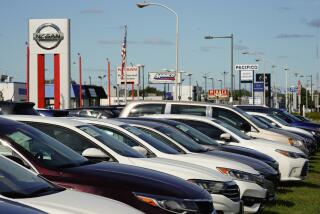Superstorm Sandy will raise used-car prices nationwide
The estimated 250,000 cars flooded by Superstorm Sandy on the East Coast will drive up used-car prices, even as far away as California.
The supply shortage comes on the heels of an already tightened used-car market in the wake of the recession, when new car sales dried up. Some experts say prices could rise $700 to $1,000 on the typical used car in the short term. Although those effects will be felt most acutely near the flood zone, the increasingly digital and national market for used cars will spread the price shocks widely.
The flood of Sandy-damaged cars further poses the risk that many will wind up in the hands of unscrupulous dealers peddling to unwitting consumers. The vehicles pose both financial and health risks.
Test your knowledge of business news
“Cars that have been submerged in saltwater, and contaminated by bacteria and various toxins, will soon start to appear all over the country, even in states far from the center of the storm,” said Rosemary Shahan, president of Consumers for Auto Reliability and Safety.
Shahan said there were cases of Nissan vehicles flooded by Hurricane Katrina auctioned as “new” as far away as California after that storm.
She urged shoppers to look for signs of flood damage, including engines that hesitate or run roughly, musty interior smells or signs of silt residue or premature rust.
Buyers should also run the vehicle information number through the National Motor Vehicle Title Information System at vehiclehistory.gov. Insurers, salvage pools, auctions and junkyards in all 50 states are required to report all total-loss vehicles to this federal database within 30 days, Shahan said.
For new vehicles or those still within the factory warranty period, shoppers who suspect flood damage should call the manufacturer to ask if they will honor the warranty, which is typically nullified for flooded cars. If the vehicle was registered as a flood vehicle, the manufacturer won’t honor the warranty, and the buyer will know there is a problem.
Although properly restored and titled salvage or flooded vehicles can be an “economical option,” consumers should understand what they are getting.
“There is always a chance that there will be problems down the road with corrosion or malfunctions in the electrical systems,” said Bob Passmore, senior director at the Property Casualty Insurers Assn. of America.
Rising prices caused by the storm might be one reason why consumers would turn to such cheaper options or fall victim to an attractively priced vehicle with hidden flood damage.
Prices are already comparatively high for late-model used cars, according to industry analysts. That’s because of the low number of new cars sold in 2009 and 2010, which also slowed the flow of trade-ins into the used-car market. Leases, a major source of used cars, nearly disappeared.
Now the flood of Sandy-damaged cars is putting more pressure on the tight supply of late-model cars. Prices will go up at least 0.5% to 1.5% in December, said Jonathan Banks, an analyst with the National Automobile Dealers Assn. The dealer group said that amounts to a little more than $50 to $175 for the average used vehicle.
Auto information company Edmunds.com has a much higher estimate, saying that used-car prices will climb $700 to $1,000 “in the short term.”
The price hikes will be highest on the East Coast but felt nationally, Banks said.
“We have seen a trend for dealers, regardless of where they are located, buying inventory online, and that means that geography is not as important as in the past,” he said. “It used to be that dealers would buy cars from a physical auction near their dealership.”
Pulling such a huge number of vehicles out of the U.S. fleet will have an effect at the national level, Banks said.
The problem is compounded by at least tens of thousands of new cars that were destroyed both at dealerships and storage yards in parts of New York and New Jersey hit hardest by the storm.
“Many dealers lost a significant amount of inventory. One Honda dealer told me he lost 600 new units,” Banks said.
Fisker Automotive Inc., the Anaheim maker of $100,000 plug-in hybrid sports cars, said it lost 338 vehicles, with a retail value of nearly $34 million, at a port storage facility in New Jersey. Toyota Motor Corp. has said it might have lost as many as 4,500 new Toyota, Scion and Lexus vehicles to flooding and storm damage. American Honda Motor Co. said that more than 3,000 new vehicles at its dealers and storage yards suffered flood damage.
All this is going to create problems for consumers in the storm region who need to replace their rides quickly.
“Prices could really shoot up for consumers buying cars right away, because they will run into a severe inventory shortage,” Banks said.
The dealers group believes that some replacement buying will start this month but will pick up in December and run through February. Banks expects that about 30% of buyers will purchase new cars and the remainder will choose used cars.
The buying, however, should provide a boost for the economy, said Edmunds.com Chief Economist Lacey Plache.
“Even if 100,000 damaged vehicles are replaced by the end of the year, it could boost auto sales 3% to 4% for the quarter,” Plache said. “That has a positive effect on the economy overall.”
More to Read
Inside the business of entertainment
The Wide Shot brings you news, analysis and insights on everything from streaming wars to production — and what it all means for the future.
You may occasionally receive promotional content from the Los Angeles Times.











